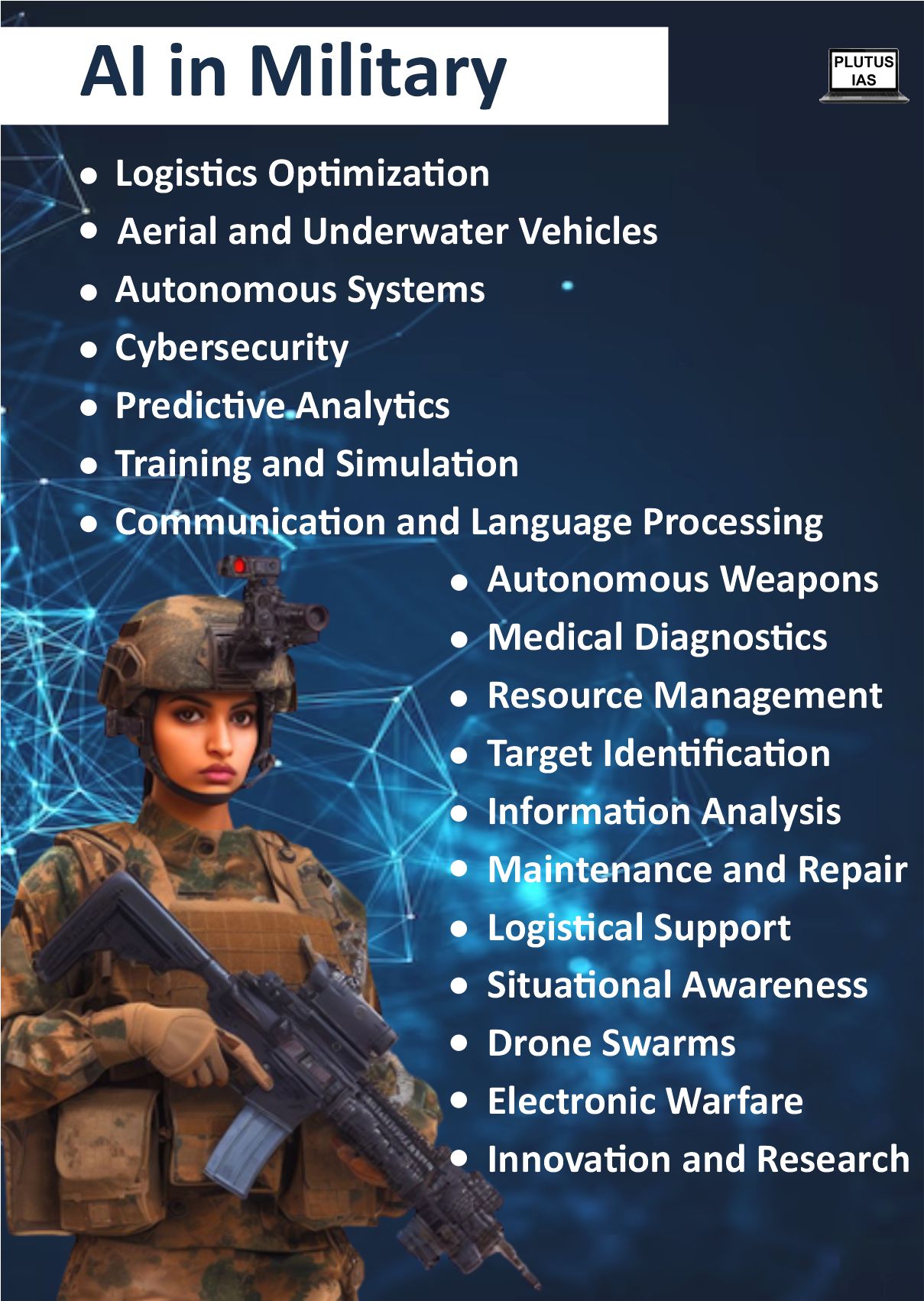23 Oct AI in the Military
This article covers “Daily Current Affairs” and the topic details “AI in the Military”. This topic has relevance in the “Security” section of the UPSC CSE exam.
For Prelims:
AI in the Military
For Mains:
GS3: Security
AI’s role in the Military and challenges associated with it
Why in the news?
The Indian military has commenced the deployment of AI-driven surveillance systems along its border regions with Pakistan and China.
Artificial Intelligence (AI)
- Artificial Intelligence (AI) is a branch of computer science dedicated to tackling cognitive challenges typically associated with human intelligence, such as learning, problem-solving, and pattern recognition.
- This emerging technology empowers machines to perceive, understand, and interact with their environment by simulating human capabilities.
AI’s Role in the Military
The versatile nature of AI allows for its application in both civilian and military domains, providing mutual benefits. Countries recognise AI as a force multiplier in military operations in the following sectors:
- Enhancing Surveillance
-
- AI with geospatial analysis extracts vital intelligence from devices like radars and automatic identification systems, detecting illegal or suspicious activities.
- The Indian army has deployed 140 AI-based surveillance systems, including high-res cameras, sensors, UAV feed, and radar feed.
- AI in Weaponry
-
- Using AI-driven drones and robots for border patrols extends the scope of surveillance and diminishes the necessity for human involvement in perilous scenarios.
- Cybersecurity in Digital Warfare
-
- Cyberspace is now recognised as the fourth theatre of warfare, alongside land, sea, and air.
- AI-driven machine learning safeguards regions from compromised networks by accurately classifying normal and intrusive activities.
- AI in Autonomous Systems
-
- AI-powered computer vision programs, like those in self-driving cars like Tesla, navigate autonomous unmanned aerial vehicles (UAVs) in conflicts, such as the Nagorno-Karabakh situation in Azerbaijan.
- Personalised Soldier Recommendations
-
- In the United States, algorithms that customise user watchlists on streaming platforms are set to become part of the armed forces’ cognitive tools, advising soldiers in communication-restricted or resource-constrained settings.
- Logistics and Supply Chain Management:
-
- AI can be readily deployed in logistics and supply chain management, which lies at the core of a well-equipped military.
- Facial Recognition and Language Translation:
-
- The Indian Army has used AI for facial recognition, language translation (Mandarin to English), remotely operated weapon stations, robotic mine detectors, and intrusion detection systems.

Challenges linked to the adoption of AI technology in the military:
- Autonomous Weapons: AI-powered autonomous weapons could decide when and whom to engage in combat. This raises ethical concerns about the lack of human control over lethal force.
- Data Security: AI systems are reliant on vast amounts of data. Protecting sensitive military data from cyberattacks and unauthorised access is a significant challenge.
- Bias and Discrimination: AI algorithms can inherit biases in the data they are trained on, potentially leading to discriminatory actions domestically and in international conflicts.
- Malfunctions and Errors: AI systems can malfunction or make mistakes like all technology. In the military context, such errors can have severe consequences.
- Escalation Risks: AI can speed up decision-making processes, potentially escalating conflicts more rapidly than human decision-makers can respond.
- Erosion of Human Decision-Making: Over-reliance on AI could erode the essential role of human judgment in complex military operations.
Recommendations
- Further research and analysis in each area of AI application within the military.
- Collaboration with international organizations to establish ethical guidelines and norms for AI in warfare.
- The development of AI training programs for military personnel to ensure efficient and responsible AI integration.
AI’s role in modern military operations is multifaceted, offering advantages in surveillance, cybersecurity, and decision support. However, ethical challenges and international norms must be carefully considered. This concept note aims to foster a comprehensive understanding of AI’s impact on military affairs and the responsible and effective use of AI technology in the defence sector.
Sources: Why the Indian Army is embracing AI | Explained News – The Indian Express
Download plutus ias current affairs eng med 23rd Oct 2023
Q1. Consider the following:
- Surveillance
- Cybersecurity
- Logistics and Supply Chain Management
- Language Translation
How many of the aforementioned are applications of Artificial Intelligence in the Military?
(a) Only one
(b) Only two
(c) Only three
(d) All Four
Q2. Discuss the evolving role of Artificial Intelligence (AI) in modern military operations, highlighting its applications and strategic implications.




No Comments